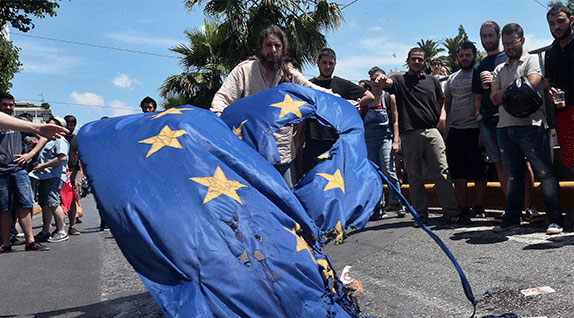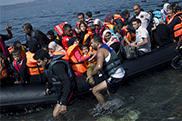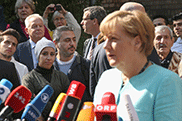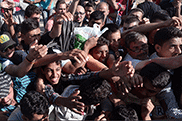 Louisa Gouliamaki/AFP/Getty Images
Louisa Gouliamaki/AFP/Getty Images
Article
Each of Europe’s problems is complex. They become even more complicated when accounting for all of the emergencies the power bloc is currently facing. What trends should you focus on to understand what the future holds?
Learn the why behind the headlines.
Subscribe to the Real Truth for FREE news and analysis.
Subscribe NowThings are not going well for the Continent. At least that is the impression many newspaper editorial columns give. An article in The Guardian remarked there is a crisis “too big for Europe to handle” and that “its institutions are broken.” A writer for Salon asked: “How did the European project go so wrong?” And an inundation of others forecast the breakup of the eurozone, the end of borderless travel, the demise of the European Union all together.
Indeed, the power bloc is embroiled in quite a number of crises—everything from the early summer Greek debt crisis to ongoing tensions with Russia over Ukraine and mutual military buildup along Europe’s eastern border. The most pressing emergency is the rapid influx of migrants from Syria, Iraq and North Africa.
 Aris Messinis/AFP/Getty Images
Aris Messinis/AFP/Getty Images Yet such dire predictions and worries are nothing new. EU crises are often painted as existential. In 2011, a Financial Times headline warned, “The Eurozone Really Has Only Days to Avoid Collapse.” A 2005 opinion piece stated, “Europe as we know it is slowly going out of business.” The same year, Forbes printed a piece titled “The End of Europe?”
Each time hardship enters the picture, many knee-jerk into thinking the EU is doomed. It is their go-to focus. Such a position seems feasible because of the sheer amount of problems the bloc faces. It also can be an effective tool to spur swift political action.
Others tend to view Europe’s crises from a humanitarian angle. They look at how political, military and business policies affect the men, women and children on the ground.
Greece’s debt crisis is a perfect example. While it is easy to become hyper-focused on the debate between austerity and debt forgiveness, it also affects people’s livelihoods. An article about how a restaurant owner had to close a multi-generational family business helps to put things into perspective.
The stakes are much higher within war-torn Ukraine. After fighting broke out in April 2014 between EU supporters and pro-Russia fighters, the United Nations Human Rights Office has kept an eye on the situation.
The agency’s latest report stated that more than 6,400 people have been killed since the conflict’s start. This conservative estimate includes at least 626 women and girls in eastern Ukraine.
In addition, the UN office reported that Ukrainians are subject to “shelling, executions, arbitrary and illegal detentions, torture, ill-treatment, human trafficking and the lack of justice and accountability, as well as deprivation of economic and social rights that are deeply affecting the five million people living in the conflict-affected areas.”
“Millions of ordinary women, men and children in Ukraine have suffered tremendous hardship, violence and have been living in fear for more than a year now,” the UN agency’s high commissioner said. “Too many have had their homes and livelihoods destroyed and their lives torn apart, with no sign of justice, accountability, compensation or redress.”
Focusing on the human toll helps bring a fuller picture to what could otherwise be seen as a conflict between Russia and the EU.
Such tragedy pushes many civilians and politicians in Europe to want to act. This has clearly been the case with the immigration crisis.
“The latest migrant disaster, in which thousands are scrambling to reach the EU from Greece, Italy and Hungary, has brought more attention to the tragic issue of refugees trying to cross to Europe,” The Telegraph reported.
 Angelos Tzortzinis/AFP/Getty Images
Angelos Tzortzinis/AFP/Getty Images“It is estimated that since January 2015, 350,000 refugees have desperately packed onto overcrowded vessels to Italy after fleeing war-torn countries such as Iraq, Syria and Libya.
“Now, migrants are increasingly using road and rail transport to access the EU. The deaths of 71 migrants who suffocated on board a lorry abandoned in Austria is one of the most recent examples.”
The image that galvanized public and political opinion was that of a drowned child sprawled on a beach, the water lapping at his lifeless body.
Both focuses—declaring the impending doom of the EU and examining the humanitarian element—have a similar goal for each European crisis. They look to incite change.
But these do not speak to what the future holds for the European continent or what the EU will look like in five, 10 or 15 years.
To understand that, one must look elsewhere.
Different Angle
Regular readers of The Real Truth know that the publication takes a unique approach to examining world trends and conditions. Writers for the magazine use the Bible as the lens through which to view world events.
For many, using a “religious text” to examine global trends may seem odd, yet God’s Word is an invaluable tool for making sense of the modern world.
For example, it is a comprehensive handbook on human nature. It shows exactly what makes man tick—and why he does what he does.
Bible prophecy, however, is the most valuable tool for understanding where world events are heading. This subject fills one-third of the Book.
A simplified definition of prophecy is news written in advance.
The book of Isaiah states, “Remember the former things of old: for I am God, and there is none else; I am God, and there is none like Me, declaring the end from the beginning, and from ancient times the things that are not yet done, saying, My counsel shall stand, and I will do all My pleasure” (46:9-10).
In the Bible, God declares that specific events will happen, then He brings them to pass. This is summarized in the next verse: “I have spoken it, I will also bring it to pass; I have purposed it, I will also do it” (vs. 11).
God claims authorship over the entire Bible and tells skeptics to prove His Word by placing already fulfilled prophecies next to the record of history. Many events that were foretold have already come to pass and prove the accuracy of God’s Word.
Real Truth Editor-in-Chief David C. Pack discusses this in Bible Authority…Can It Be Proven?
“Fulfilled prophecy proves the divine authority of the Bible. No human can foretell events, let alone in great detail, to occur hundreds or thousands of years beyond his own lifetime. No person can affect the course of cities, states or kingdoms for centuries to come. For this reason, it has been said that prophecy is the challenge that the skeptics dare not accept!”
(To take God up on His challenge and see history and prophecy perfectly align, read Bible Authority...Can It Be Proven?)
About 90 percent of prophecies in the Bible, however, have not yet occurred, which makes it a crucial news source. And it has much to say on what is coming for Europe.
With that in mind, some of the EU trends to keep an eye on are Germany’s rising importance in the power bloc, the pope’s growing voice in politics, and the increasing rift between Britain and other member states.
 Sean Gallup/Getty Images
Sean Gallup/Getty ImagesEach of these is crucial to watch in current and future EU crises because the Bible declares they will culminate in a superpower United States of Europe.
Germany Leads
As the richest nation in the EU, Germany is often found bearing the EU’s burdens. The Wall Street Journal reported: “Germany’s economic influence and political stability leave the country no choice but to play a greater role in global geopolitics than it did in years past, despite public skepticism, Foreign Minister Frank-Walter Steinmeier said.
“‘Germany is a little too big and important to comment on international affairs from the sidelines,’ he said at an interview in his office…‘It doesn’t mean we’re pushing to get involved, but it means we cannot abstain when help is needed.’”
Berlin was instrumental in negotiations during the Greek debt crisis and is also taking a central role in the refugee emergency.
Bloomberg reported: “The European Union will…announce plans to redistribute 120,000 migrants who have arrived in Greece, Italy and Hungary, as the bloc moves to address the biggest refugee crisis since World War II.”
German Chancellor Angela Merkel stated that she will work to make accepting refugees “one of the grand projects of the European Union in the years ahead” (ibid.).
The nation has also fostered greater ties with the pope. A meeting with the Vatican pontiff revealed how much Germany’s head of state placed significance on the pope’s view of world affairs.
 John Macdougall/AFP/Getty Images
John Macdougall/AFP/Getty Images Ecumenical News wrote: “The German leader had a 40-minute private audience with the head of the Catholic Church on Feb 21, after which she told reporters, ‘I was very happy to meet with the Pope’ Deutsche Welle reported.
“An official communique said the cordial exchange between the two leaders focused on the fight against poverty and international crises, including the conflict in eastern Ukraine, the Vatican reported. Merkel played a key role in hammering out the latest shaky ceasefire and at the meeting with the pontiff, she stressed their ‘commitment to reaching a peaceful solution to the conflict in Ukraine,’ the Vatican statement said.”
Influential Religious Figure
Pope Francis called upon “faithful” worldwide to pray for Greece’s faltering economy and suffering people. In the heat of the 2015 euro crisis, Federico Lombardi, the Vatican’s spokesperson, released a statement that passed on the religious leader’s “wishes to convey his closeness to all the Greek people, with a special thought for the many families gravely beset by such a complex and keenly felt human and social crisis.”
The leader of 1.2 billion Catholics worldwide also urged EU leaders to prioritize the “dignity of the human person,” which is one of the church’s doctrines that emphasizes an individual’s right to live and prosper—and often involves distribution of wealth to the poor.
 Vincenzo Pinto/AFP/Getty Images
Vincenzo Pinto/AFP/Getty ImagesThe pope’s discourse is backed by a trend of increased involvement in state affairs. The political pope was a key player in prompting talks between the United States and Cuba, which resulted in the two establishing a diplomatic relationship for the first time in over 50 years.
Though condolences, prayer requests, and pleas for social justice are Pope Francis’s trademark, his statements also characterize increased papal involvement and warmer relations with Eastern Orthodox countries. The two great religious bodies held a relatively distant relationship until Pope John Paul II visited Greece in 2001—the first papal visit to the Orthodox nation in 1,291 years.
In return, Orthodoxy is looking back to Europe. Prior to the referendum, Archbishop Ieronymos II, head of the Autocephalous Orthodox Church of Greece, asked Greeks to remain “at the heart of Europe,” and urged them to accept bailout conditions.
In September, the Catholic leader urged every “parish, religious community, monastery and sanctuary to take in one refugee family,” The Washington Post reported. The plea came as thousands of refugees left Hungary and streamed into Germany.
The media outlet continued, “The pope, who has thrust himself into polarizing debates over climate change and free-market economics, has again entered the fray, this time over how Europe should handle its largest wave of refugees since the Balkan wars of the 1990s.”
British Resistance
Britain has been considered the stone raft slowly drifting away from continental Europe. The nation has increasingly butted heads with the power bloc’s concentration on greater unification.
The nation has been at odds with the EU at every turn—even during the immigration crisis.
The Guardian reported: “David Cameron’s limited promise of only 4,000 places a year for Syrian refugees provides a glimpse of the impotence of Britain’s future role in world affairs outside the EU.
“His Commons promise to take 20,000 Syrian refugees over the next five years is at the bottom end of expectations. It stands in sharp contrast to the French pledge of 24,000 places over the next two years. As the Labour MP and father of the house, Gerald Kaufman, angrily pointed out: ‘The Germans took in 10,000 refugees in one day.’
“Cameron has deliberately spurned taking part in a much bigger EU scheme to resettle those in the camps in countries neighbouring Syria. He has also rejected playing any part in the expected EU request this week to relocate the estimated 160,000 refugees who have made it across the Mediterranean to Italy and Greece or through the Balkans to Hungary.”
Watch to see Britain continue to hold to policies that differ from the rest of Europe, or possibly fall out—or be pushed out—of the union all together.
What to Watch in Every Crisis
While the Bible tells you what to watch in every European crisis, it also speaks to what global trends and conditions on which to keep an eye.
With today’s 24-hour news cycle, there is a constant barrage of reports of every kind—and most of it is tabloid non-news. There is so much to sift through that many become overwhelmed and stop watching all together.
 Louisa Gouliamaki/AFP/Getty Images
Louisa Gouliamaki/AFP/Getty ImagesThe Real Truth is here to help! Keep reading this monthly magazine to better navigate this befuddling and darkening age.
You can also understand what the Bible says will befall all mankind in the next few years.
In the introduction to The Bible’s Greatest Prophecies Unlocked! – A Voice Cries Out, Mr. Pack states: “There is gnawing concern on the minds of millions about the course of human events. As world trends and conditions grow worse, and ever more confusing and complex, uncertainty is increasing—and worry is deepening—about what lies ahead for all mankind.
“Towering questions loom over every nation!
“Everyone wants to know what the future holds. So many are confused, not knowing where to turn for answers to the GREAT QUESTIONS about the future!
“Suppose you could know the direction and conclusion of world events—world history—in advance of the outcome. What if you could know the courses of nations before they happen? What if the future of great nations—indeed the greatest nations—could be known? Imagine knowing tomorrow’s biggest headlines before they come to pass, and how events will affect you, and every human being, personally.”
He continues: “Tragically, most Bible readers are completely unaware of awesome, impending world events, soon to involve all nations. Vast sections of Scripture are hidden, and remain outside their understanding—completely lost to them. The result is that most simply have no idea what the future holds.
“Many have opinions, but few recognize how to find the answers. Others think they already understand the prophecies of the Bible. The result? They remain ignorant of fascinating, incredible—vital!—knowledge, life-changing knowledge.
“No book you have read, or ever will, on prophecy is like this one.”
In addition, keep reading this magazine for analysis of the latest news events and how they specifically fit into all that is to come.
More on Related Topics:
- Spain Is Granting Legal Status to Potentially 500,000 Immigrants
- Bulgaria’s Government Resigns After Mass Protests
- 10 Years After the Bataclan Massacre, Paris Is Still Scarred by That Night of Terror
- French Government Collapses in 14 Hours, Deepening Political Crisis
- French Parliament Ousts Prime Minister, Deepening Political Crisis


